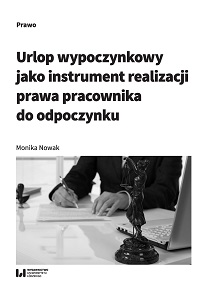Urlop wypoczynkowy jako instrument realizacji prawa pracownika do odpoczynku
Annual Leave as an Instrument of Exercising Employee’s Right to Rest
Author(s): Monika Nowak
Subject(s): Economy, Law, Constitution, Jurisprudence, Civil Law, Law on Economics, Human Resources in Economy, Sociology of Law
Published by: Wydawnictwo Uniwersytetu Łódzkiego
Keywords: annual leave; rest; right to rest; right to annual leave; time off; working time; holiday call-back; leave rules; holiday entitlement; leave on request; urlop wypoczynkowy; prawo do odpoczynku; czas pracy; prawa człowieka; prawo pracy
Summary/Abstract: An employee’s right to rest is one of the fundamental employment rights. It is primarily informed by the universal value, as well as legal category, of human dignity. Also, the right to rest must be perceived as an effective guarantor of dignity. This is so because it conditions the full exercise of other fundamental human rights attributed to every human being, e.g. the right to life, security, liberty, health, or development. The approach to the legal issue of working time and time-off has undergone major modifications over time. While in the mid-20th century the first and foremost demand was to reduce working time, these days more attention is being given to the liberty to have it flexibly scheduled. This is largely informed by the need to seek new forms of working time management in connection with progressing globalisation and the ensuing strong competition and irregular living and working conditions. Hence, the significance of rest is on the increase. The foregoing phenomena are essentially boosting the pace of life and work, as well as ever-increasing expectations from employees, both in terms of their qualifications and availability. This is increasingly causing fatigue and stress and, what follows, a series of ailments and psychosomatic disorders, as well as the so-called job burnout which is afflicting more and more groups of employees, including the young ones. All this is also enhancing the apparent process weakening the role of the family and social relationships. Therefore, in the best interest of both society and individuals it is essential to enact or preserve the right to rest, as much as it is to usher in such legal instruments that will be conducive to its effective exercise and help alleviate the negative effects of the phenomena contemplated herein above. One such fundamental instrument is the right to holiday. This right entitles an employee to take an annual leave from work in order to regenerate their mental and physical powers and, what follows, help protect their life and health. The right to holiday is the principal subject of this book. However, the book is not intended to present and analyse in full all the relevant solutions adopted by the Polish legislator, but rather to assess the structure of holiday leave and the rules of it being granted on the grounds of Polish laws and regulations in the context of the functions which such a leave should fulfil, and the extent to which abided by is one of the fundamental principles of Polish labour law - the right to rest. The author’s focus is, therefore, on those elements of holiday entitlement which most strongly affect the said assessment. Following a close examination of the subject matter, as presented in the book, it transpired that an employee’s right to rest – in the light of the existing Polish legislation – is not abided by to the optimal extent – also in respect of holiday entitlement. Some of the legal solutions discussed in the book and concerning holiday entitlement of employees, above all those laid down in the Labour Code, but also in special legislation (in particular that applicable to teachers and temporary employees), not always, when it comes to details, fully meet the requirement to minimise any and all interferences by the legislator that disturb the normal course of holiday rest. Objectionable are, e.g. the practicalities of the rules within holiday entitlement which were posited to ensure full achievement of the objectives of holiday leave, but also, in certain cases, the terms and conditions of acquiring the right to holiday leave. Also, worthy of note is the absence of an adequate legislative response to growing fatigue caused by the length of service of long-term employees, or the increasingly doubtful rules of eligibility for the right to rest – also including holiday entitlement. It is rather difficult to find convincing arguments that would weigh in favour of restricting this right exclusively to individuals enjoying the employee status, especially that over the last dozen or so years the legal basis for performing gainful work has changed dramatically. Employees are still the prevalent group of working people, but there is a high percentage of individuals working otherwise than on employment contracts, in particular on civil law contracts, in terms of which the conditions of working do not essentially vary from employment contracts. The perception of the title holiday leave as an instrument of exercising the right to rest obviously required some systemisation of the normative material and output of the doctrine and judicature in respect of the right to rest. Therefore, the first part of the book attempts not only to clarify the very notion of rest, its meaning and nature, but makes references to the basic legal measures which in the past were and now are to serve the purpose of rest (daily and weekly rest, days off work, rest breaks at work, holiday leaves). Such measures ensue not only from the fundamental principle of an employee’s right to rest enshrined in Polish laws and regulations, but also in international and European acts, whose regulations are more broadly discussed in the book.
- E-ISBN-13: 978-83-8088-933-0
- Print-ISBN-13: 978-83-8088-932-3
- Page Count: 384
- Publication Year: 2018
- Language: Polish
- Table of Content
- Introduction
- eBook-PDF
- Sample-PDF

